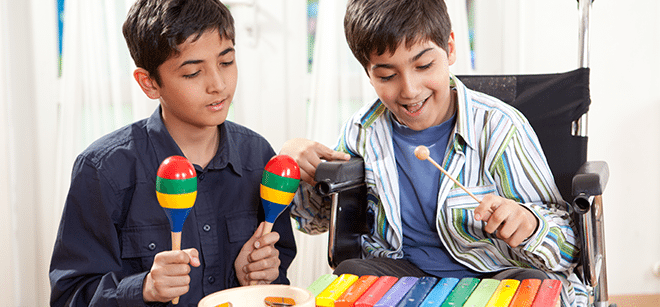5 Reasons Why Music Helps Children with Special Needs

We all know how powerful music can be in our lives, helping us make it through difficult days and pushing us through troubled nights. But, did you also know that music is an excellent educational aid for children with special needs? Is it because of the innate creativity of music? Is it because it helps individuals to connect to and support one another? It’s all of this and much, much more. Let’s take a look.
1. Music Motivates
Finding ways to motivate children to push through challenges and develop essential skills can be difficult. Music is, by far, one of the best motivators for children with special needs. Some of the ways you could use this to your advantage are:
Use captivating instruments to prompt the child to make requests. For example, holding out a drum and waiting for them to communicate “I want/would like the drum.”.
Use different instruments to assist in the development of their motor skills
Sing a song during a challenging activity, so that the child is more willing to work their way through it.
2. Music is a Multi-Sensory Activity
Picture a child playing the drums. On the surface, most people would just see a kid hitting their drum-kit, even though there’s so much more going on than you’d think. Let’s break it down:
Their tactile system is engaged, because they are feeling the instrument in their hands.
Their kinaesthetic system (their sense of movement) is engaged as they move their wrists and arms to strike the drums.
Their auditory system is, of course, very much engaged as they listen to the sound of the drums.
Their sight is engaged, as their eyes track the motion of their arms and the drumsticks in their hands.
Engaging all of these senses makes music perfect for children with special needs because it appeals to and engages children with all sorts of strengths and weaknesses, and helps to enhance their understanding of their senses.
3. Music involves both Hemispheres of the Brain
Unlike many activities, which only require the child to use a singular hemisphere of their brain, music is a more complete ‘mental experience’. It is a remarkable fact that we process music in so many regions of the brain at once. In fact, the Cognitive Neuroscience of Music shows that, when making music, the sensory cortex, auditory cortex, hippocampus, visual cortex, cerebellum, amygdala, prefrontal cortex, and motor cortex are all firing at once. Crazy, right?
And, if that all sounds like a lot of odd words that don’t mean much to you, simplify it into “Music is a brain workout.” This relates directly to the fact that music is a multi-sensory experience, requiring the brain to perform a great many processes. For special needs children, this can be a crucial aid in all stages of development.
4. Music can be Non-Verbal
Hans Christian Anderson himself once said, “where words fail, music speaks.” I work with a great many children, some of whom have words fail them daily. Either they struggle to get the words out, or they struggle to interpret the words coming in. It must be maddening to have limited speech skills, yet be relentlessly bombarded by words all day long. My closest personal experience to this was getting myself lost in rural Vietnam. I desperately tried to communicate with the farmers and village locals but, as the words rapidly sprayed out of their mouths, I felt confused, frustrated, and helpless. We totally couldn’t understand each other.
I often reflect on this experience when I work with a child who is non-verbal. When we connect and express ourselves without words, music becomes far more powerful and efficient than the spoken word. Most importantly, this type of therapy and interaction is a huge relief for such a child who is continuously bombarded by social interactions involving speech.
5. Music Helps Create Strong Bonds
Music easily ranks itself among the richest and most beautiful ways to communicate with your child, strengthening the bonds that hold you close to one another. Mothers have known for centuries. Now, in fact, science is showing us that Oxytocin, often known as the ‘bonding’ or ‘cuddle’ hormone, is released when listening to and making music. Some of the musical ways you can bond with your child include:
Developing a routine of singing to your child throughout the day
Moving and dancing with them to their favourite songs
Use simple instruments, such as rhythm sticks, to create your music. You can also play along to already recorded music.
It is essential to try many different ways o20f connecting through music. During this process, you will discover more about what your child likes and dislikes. Once you have a few musical activities that your child enjoys, you are all set.
The Power of Music
As a final word, “Music is Powerful.” Not only are there mountains of anecdotal evidence that tells us this, but the fields of Neuroscience and Music Therapy are stacked with data that supports such a conclusion. Music in a relaxed, fun, and motivating way to connect with special needs children and motivate them to develop new skills. So, grab your child, grab some instruments, and make some music!
